Towards a Christianity with an African face.
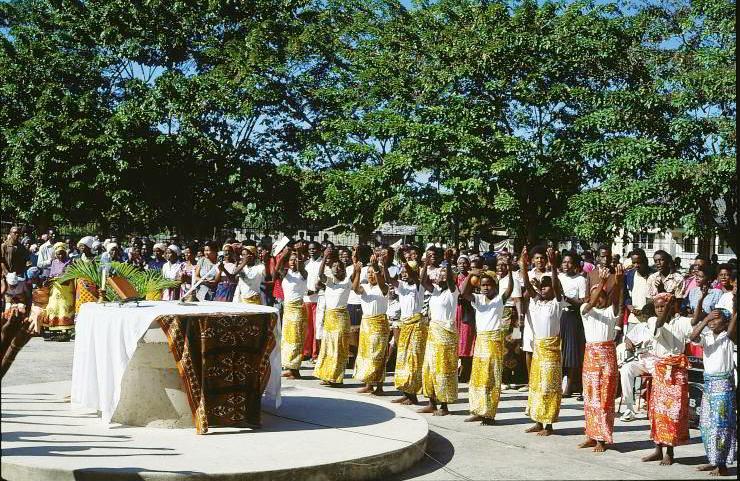
Economic autonomy and autonomy of thought. These are the prerequisites for facing the great challenges that the Church of Africa is experiencing today. The Vice-rector of the Catholic University of West Africa, Father Benjamin Akotia, talks to us about it.
Father Akotia is originally from Togo, but he is used to discussing and exchanging views between two continents: his homeland, Africa, and Europe, the continent where he studied and where he often returns. Dean of the Faculty of Theology at the Catholic University of West Africa (UCAO), based in Abidjan, Ivory Coast, he became Vice-rector in February 2023. With him we discuss some of the themes and challenges that the African church is experiencing today, such as inculturation, identity, autonomy, young people, synodality, homosexuality…
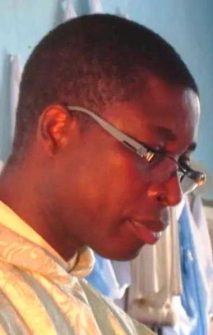
Father Benjamin Akotia / D.R
Speaking of inculturation, Father Akotia sees a return to traditionalism and a lack of interest among young African priests: “When I was a young student and then a priest, there was a lot of talk about inculturation and a lot of effort was also made to introduce new elements into the liturgy. Inculturation was also experienced as a search for identity. Today I see a movement in reverse. Paradoxically, we are trying to be more like the West. I have the impression that we are more concerned with doing what everyone else does: in the new generations of priests, even in Africa, I see a return to traditionalism or perhaps even a certain superficiality. There is no longer any drive, not even in claiming to be ourselves.”The Vice-rector continues: “I notice a strong anti-Western feeling. Sometimes it is a way to express the fact that we no longer want to feel inferior, that we no longer accept the lessons of others. But not in the right way. We think we are equal because we know how to do what Europeans do. It is a problem of reflection on ourselves. Who are we really? What are we capable of? What can we bring
that is authentically ours?”
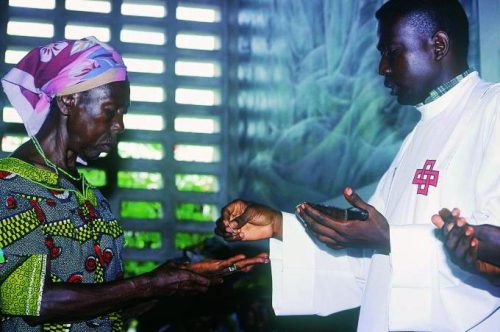
DR. Congo. A priest giving communion in a parish in Kinshasa. File swm
From a theological point of view, Father Benjamin recognizes that it is difficult to see figures or schools emerging as there have been in the past. He comments: “In universities, even some great theologians of the past such as Jean Marc Ela or Engelbert Mveng and others are barely mentioned. Also, because it is believed that in their theological reflection, they used the categories of Western thought. It was a cycle that had closed. Now, the new cycle that is timidly opening up is that of a theology that starts from African traditions, for example by rereading the Bible in the way in which we pass on our stories. The attitude is no longer to “purify” African culture, but to understand it and use it to reinterpret Christ, the sacraments, God, and our way of life”.
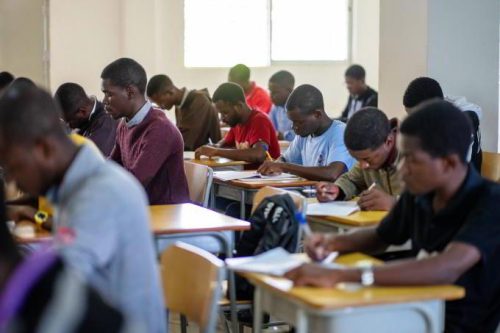
Angola. During a lesson at the seminary in Huambo. “Even some great theologians of the past, such as Jean Marc Ela or Engelbert Mveng and others, are hardly mentioned in the universities.” Photo: José Luis Silván Sen.
But what are the great themes and challenges of the Church in Africa today? “The first, it may seem banal,” says Father Benjamin, “but perhaps it is the most important, is the economic challenge. We appreciate the generosity of a mother who has nourished us, but the time has come for weaning. It is a delicate phase both for the “child” and for the “mother”. But this process must take place in peace to avoid unnecessary trauma. Personally, I am optimistic. I see many things being born, I see that we are becoming very inventive. And I see that the African Church is growing quickly, not only in numbers. And in any case, I believe that we have no choice. Only if we do not depend on others, only if we are autonomous, do we also become capable of producing our own thoughts”.At the same time, Father Benjamin emphasizes: “I think that Africa can finally say how it wants to live Christianity. There are signs. For example, we have not yet dealt with the issues of witchcraft or polygamy in depth in an African Christian spirit, using our own schemes, and our own categories. As well as, the question of the blessing of homosexual couples, which in Africa is experienced as a marginal issue, or worse, as something imposed from elsewhere. Only if the Church of Africa is able to face challenges and priorities that it feels are more its own and more urgent, African Christianity will finally have its own face and make its contribution to the heritage of universal Christianity”.
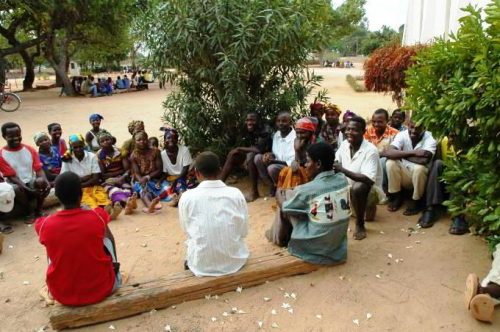
Mozambique. Pastoral centre in Anchilo. “There’s already a strong sense of synodality in our communities”. File swm
Looking at the Synod on Synodality that is being celebrated this month in Rome. Father Benjamin says: “Africa is the continent that has probably lived this synodal journey most intensely: it believes in it very much, also because it corresponds to the ways of functioning of our societies, which have the word at their centre. We talk and move forward slowly. Everyone talks. And the leader never speaks only in his own name. When he does, it’s because everyone else has already spoken. There’s already a strong sense of synodality in our communities.”
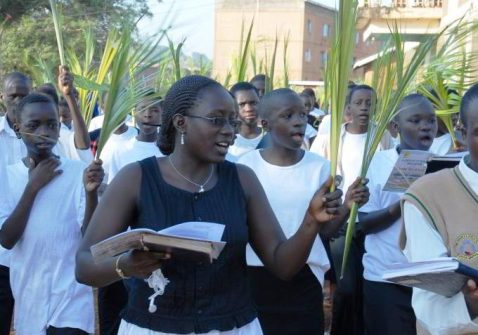
Uganda. Young people during the procession of Palm Sunday in Kampala. “We see many young people who discover the Christian faith when they come from the villages to the city or to the university, where they meet someone who is Christian”. File swm
Speaking of young Africans who represent 70% of the African population. Father Benjamin says: “We see many young people who discover the Christian faith when they come from the villages to the city or to the university, where they meet someone who is Christian. For some, the Church is synonymous with “modernity” and everything that the Western world represents. But we do not “sell” modernity, we announce Jesus Christ, an announcement of salvation. On the other hand, we also see many young people who spend their days on social media that today have the effect of prolonging and amplifying the epochal cultural changes that our societies have gone through, even in their encounter with the West. They appear standardized to us, but it is only a superficial impression. The “stuff” they are made of, that which the screen or the cell phone shapes is not the same as that of a young Westerner. And even the answers of faith must take into account that “stuff” and everything it is made of in terms of culture, traditions, and categories of thought. And also ways of living the faith.”
Anna Pozzi/MM



